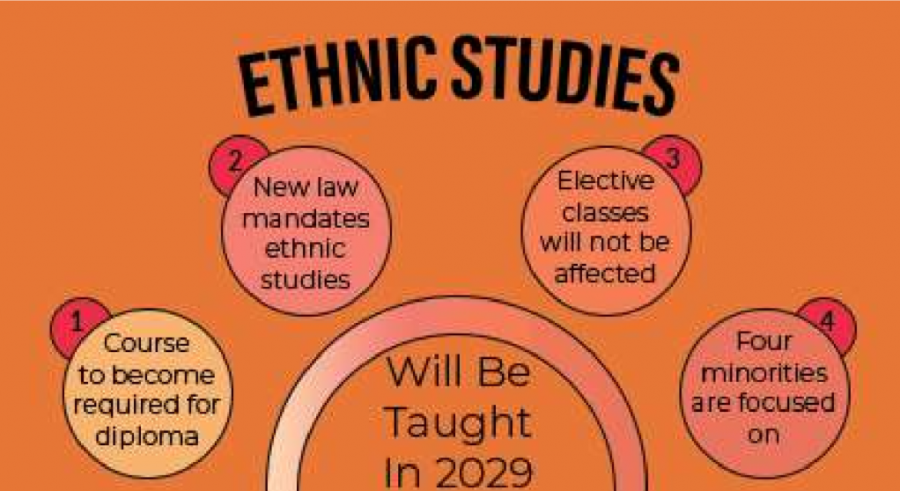Breaking cultural barriers
In an effort to expand cultural awareness among students, Gov. Gavin Newsom recently signed Assembly Bill 101 into law.
The bill requires school districts to create a curriculum that focuses on four historically overlooked minority groups: Indigenous, Asian, Latino and Black Americans. According to the bill, schools must announce plans to implement an ethnic studies course by 2025. However, students will not actually have to fulfill the class requirement until the 2029-2030 school year.
In order to craft the ethnic studies curriculum, Diamond Bar High School teachers and deans will work with Walnut High School and the Los Angeles County of Education to ensure the necessary requirements are met.
“A big part of that process often entails gathering models of curriculum that’s already in existence that would already meet the qualifications and from there explore any new additional offerings or potential insights to explore ethnic studies,” instructional dean Gabriel Aguilar said.
The WVUSD administration has created a roadmap to ensure that the necessary course content will be covered on schedule and offer a holistic view of the subject.
“The first phase that we will go through is to take advantage of any offerings that the Department of Education provides,” Aguilar said. “We will work with the Los Angeles County of Education for guidance. Strategically, Los Angeles County will offer a variety of training sessions to inform teachers, administrators and department chairs.”
The school is also working to ensure that student academic schedules are not disrupted by the addition of required courses.
“I think that it’s somewhat important for students to learn about ethnic groups and their culture, but it shouldn’t be a mandatory class,” junior Duncan Seshiki said via Discord. “Most high school students have a tight schedule and wouldn’t have time for this type of class. If it was an optional/elective class, that would be better.”
To help prevent elective opportunities from being impacted by the new mandate, DBHS is considering integrating the curriculum into an existing course. Another potential option being explored is offering ethnic studies as a single-semester credit similar to Health and ICT.
“I think we understand the value behind the updated effort, which is to recognize the value of understanding different ethnicities and cultures,” Aguilar said. “That’s a big part of why we want students to be enrolled in schools and attending schools. We are trying to find meaningful ways to expose our students to what it means to be global citizens and contributing members of our society.”
While some students are concerned about disrupted schedules, others see great benefit in the requirements set into law.
“I’m for it, because if a high school has a diploma, then they should know more about what they will teach about different ethnic backgrounds so that we, as students, aren’t misinformed about the culture of our peers,” sophomore Jimmy Chen said via Discord.
Meanwhile, other students recognized the law’s effort to increase mutual understanding between ethnic groups in the country.
“I believe that this will further deepen our understanding of different ethnicities and their stories. With such studies, the American student would be able to appreciate these ethnicities and, furthermore, respect them,” sophomore Joyce Dimetry said. “Although this might seem tedious for some students, it’s important to bring awareness to such beautiful history.”
Your donation will support the student journalists of Diamond Bar High School. Your contribution will allow us to purchase equipment and cover our annual website hosting costs.










Camille McCurry
Nov 20, 2021 at 9:35 pm
I’m taking this class in college and finding it quite informative, but the addition of more and more general education requirements is making it harder to graduate on time. I have less available units to take the courses I’m actually interested in at the end of the day. I think high schoolers shouldn’t have to take this class, so that they have the freedom to spend more time on the things they care about and exploring their interests. Not to mention that we already have courses that should be expanding on these issues to being with (history and english). I think that rather than adding new classes and overloading students’ schedules every time we see an educational deficiency, we should be updating the material in existing courses to include more relevant and forward-thinking social discourse.